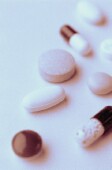 |
 |
 |

Most Newer Antipsychotics No Better Than Older Ones, Just Different
People need to find the one that works best for them, experts say|
|
HealthDay
Friday, December 5, 2008
 FRIDAY, Dec. 5 (HealthDay News) -- Antipsychotic drugs have traditionally been classified as "first" or "second" generation, but these classifications aren't valid and the drugs should be prescribed on a patient-by-patient basis, new research suggests.
FRIDAY, Dec. 5 (HealthDay News) -- Antipsychotic drugs have traditionally been classified as "first" or "second" generation, but these classifications aren't valid and the drugs should be prescribed on a patient-by-patient basis, new research suggests.
Older drugs (first-generation) are cheaper than the newer "atypical" antipsychotic (second-generation) medications and have different side effects. But, the added cost of second-generation antipsychotics -- with an estimated $7.5 billion in U.S. sales in 2003 -- has led to debate about their benefits compared with first-generation drugs.
"In recent years there has been a number of new antipsychotic, and there had been controversy over which is the best," said study author Dr. John Davis, a research professor of psychiatry at the University of Illinois at Chicago.
"What we find is that different ones are better or worse in different ways," Davis said. "Therefore, the newer drugs can't be thought of as the same class. They each have their distinctive profile, with major differences between them."
The findings were published in the Dec. 5 online edition of The Lancet.
For the study, Davis and his colleagues reviewed 150 studies that included more than 21,000 patients. The researchers looked at overall effectiveness, side effects, depressive symptoms, relapse rates, quality of life, and weight gain, among other measures.
The analysis found four second-generation drugs, amisulpride (Solian), clozapine (Clozaril), olanzapine (Zyprexa) and risperidone (Risperdal) were more effective than first-generation drugs, with "small to medium effect sizes."
But, other second generation drugs, such as aripiprazole (Abilify), quetiapine (Seroquel), sertindole (Serdolect), ziprasidone (Geodon) and zotepine (Nipolept), were no more effective than first-generation drugs, the researchers reported.
And, only aripiprazole and ziprasidone among the second-generation drugs did not induce more weight gain than the first-generation drug haloperidol (Haldol), the study found.
Comparing first- and second-generation drugs, Davis's team also found that second-generation drugs produced fewer "extra-pyramidal" side effects such as unintentional muscle contractions, Parkinson-like symptoms and restlessness than Haldol.
However, only a few of these second-generation drugs reduced these side effects compared with low-dose Haldol, the researchers noted.
In addition to Haldol, other first generation antipsychotics include chlorpromazine (Thorazine), fluphenazine (Prolixin), mesoridazine (Serentil), perphenazine (Trilafon), and trifluoperazine (Stelazine), according to the U.S. National Institute of Mental Health.
Davis thinks that classifying these drugs as first- or second-generation should be abandoned. "For patients, there is a choice only some drugs are efficacious, only some drugs cause obesity, and only some cause tremor. The doctor should choose based on whether he wants to go for efficacy, primarily, or wants to avoid side effects and the patient's history," he said. "It's a value judgment about which one should be used."
Dr. Peter Tyrer, who's with the Department of Psychological Medicine at Imperial College London in England, and co-wrote an accompanying editorial in the journal, thinks these drugs should be evaluated on their own merit and not as part of a group of newer or older drugs.
"We should dump the labels of first- and second-generation in our descriptions of these drugs," he said. "They have been used primarily as a marketing ploy to convey the impression of a steady improvement in the benefit-risk ratio of these agents, an impression that has been exposed as completely inaccurate."
Dr. Thomas R. Insel, director of the U.S. National Institute of Mental Health, believes efforts are needed to find ways to tell which patients will respond to which of the many drugs available.
"Neither class of drugs is homogenous," Insel said. "There is not a huge difference between the classes when you look at efficacy. Where the differences emerge is largely with side effects."
"It would be wonderful," he added, "if we could know how to predict which patient is going to respond to which medication, but we don't know that yet. But we do know that just because somebody doesn't respond to the first one doesn't mean they are not going to respond to the next one."
Finding "biomarkers" that would predict which drug will work for a given patient is going to be the focus of new research, Insel said. "We really need to get serious about personalized medicine for psychiatric illnesses," he said.
HealthDay
Copyright (c) 2008 ScoutNews, LLC. All rights reserved.
Related News:
More News on this Date
Related MedlinePlus Pages:
| Home | Health Topics | Drugs & Supplements | Encyclopedia | Dictionary | News | Directories | Other Resources | |
| Disclaimers | Copyright | Privacy | Accessibility | Quality Guidelines U.S. National Library of Medicine, 8600 Rockville Pike, Bethesda, MD 20894 National Institutes of Health | Department of Health & Human Services |
Date last updated: 08 December 2008 |




